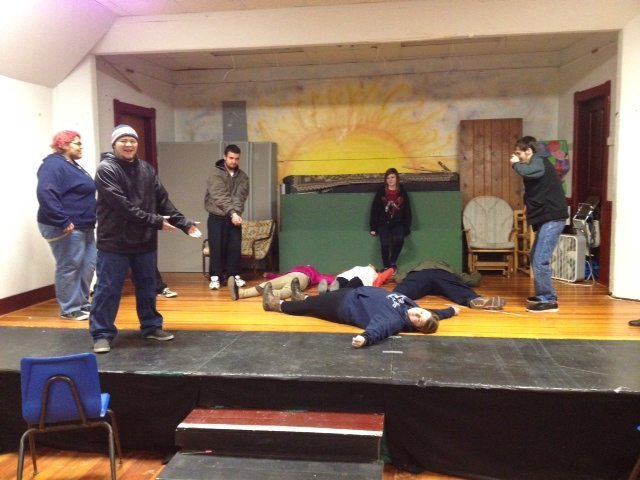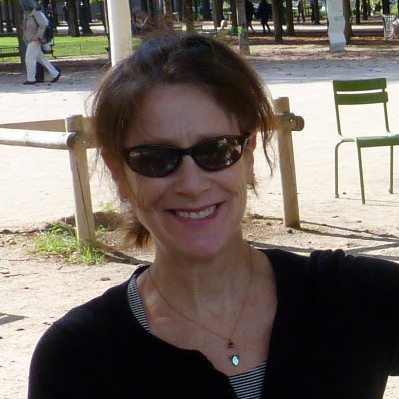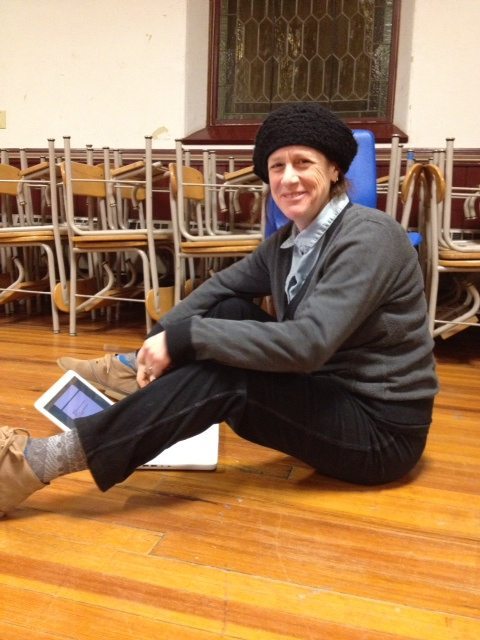Last Thursday, as I watched two PMP kids shape a scene, I was impressed by their fearless improvisational dexterity. The scene’s basic through-line was the friction that comes when two characters are engaged in the same activity, but have opposing objectives.
These actors kind of had a sense of the beginning and sort of knew where it needed to land, but how they were going to get there was anybody’s guess.

Students in the North Adams PMP group
Suggestions started to fly:
Who are you addressing, and why?
Bring in another character?
Ground the scene.
Get up and move around.
“I don’t know where I’m going with this!” one of them said.
“What are your key beats?” Kate Merrigan asked.
Beats. Tempo. Pacing.
This is the language of music.
Rests—the silence between the words that’s as articulate as any word.
Dramatic high note as fortissimo.
Understated pianissimo?
Recapitulation of an idea.
Instrument solo as a kind of monologue.
Basso continuo undercurrent.
But take any musical score. Replace those notes with words and you have the language of playwriting.
I’m in the middle of teaching Anton Chekhov’s Uncle Vanya. Chekhov never tells us how to read his lines. He leaves that to the actors.
“Oh, God, this is awful…” Yelena says after Vanya professes his love. Is she filled with dread? Bemused?
“He says that we can’t,” Sonya says to Yelena, when her father denies her the pleasure of playing the piano late at night. Are they resigned? Giddy? Deflated?
I’ve seen stage productions and movie versions of the play; every interpretation is wildly different. But if the actors are committed to how they play the “score”, the audience will believe their choices—their interpretation.
Or if Chekhov’s not your cup of tea, try this: John Coltrane and Rogers and Hammerstein.
Couldn’t be more different.
And yet. They’re both “My Favorite Things”.
Meet our PMP Blogger
 Jane Denitz Smith is a proud member of Dramatists Guild, through whose aegis she recently held a staged reading of Death by Chocolate and Barbecue, new full-length plays. Most recently, Spread My Ashes By the Rental was part of the Made in the Berkshires Festival. Last May, Mary Durning’s Soup and Other Cultural Divides was included in Boston Theatre Marathon. Ten-minute plays have workshopped in Jen Whiting’s Ten-Minute-Play Workshop podcasts and, in 2011, scenes from After Prom, a full-length play, were staged as part of the Berkshire Festival of Women Writers. Jane is the author of three Young Adult novels, published with HarperCollins. She teaches and lives with her family in Williamstown, Mass.
Jane Denitz Smith is a proud member of Dramatists Guild, through whose aegis she recently held a staged reading of Death by Chocolate and Barbecue, new full-length plays. Most recently, Spread My Ashes By the Rental was part of the Made in the Berkshires Festival. Last May, Mary Durning’s Soup and Other Cultural Divides was included in Boston Theatre Marathon. Ten-minute plays have workshopped in Jen Whiting’s Ten-Minute-Play Workshop podcasts and, in 2011, scenes from After Prom, a full-length play, were staged as part of the Berkshire Festival of Women Writers. Jane is the author of three Young Adult novels, published with HarperCollins. She teaches and lives with her family in Williamstown, Mass.

